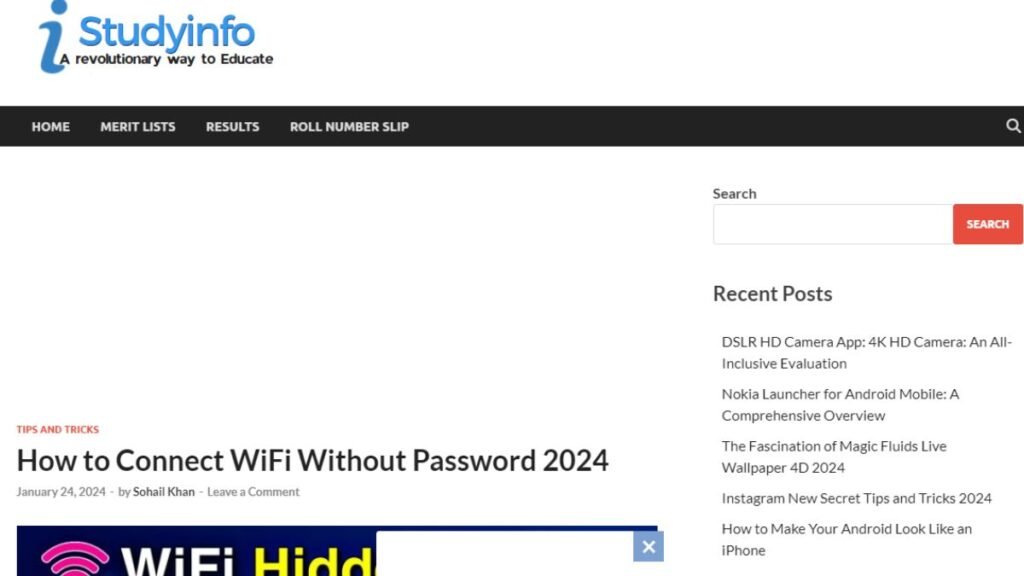Recently, Istudyinfo.com has saturated the internet with viral videos, particularly on platforms such as Instagram Reels and YouTube Shorts.
One of the most popular videos promises that you can find the password to any WiFi network by merely entering its name. The concept sounds intriguing, especially in an age when keeping connected is crucial.
But is this claim true, or is it another online fraud? In this article, we will look at the reality and consequences of Istudyinfo.com’s WiFi password finder claims.
Table of Contents
1. Understanding the Claim
Istudyinfo.com’s viral video suggests that you can discover the password of any WiFi network just by entering its name on their platform.
This concept appeals to many because it promises easy access to WiFi networks without needing the owner’s consent. However, the big question remains: Is this even possible?
2. Is It Technically Possible?
Before we jump to conclusions, let’s break down the technical aspects:
- WiFi Security Protocols: Most WiFi networks are protected by encryption protocols like WPA2 or WPA3. These protocols are designed to safeguard the network by encrypting the data, making it almost impossible for unauthorized users to access the password without the owner’s consent.
- Brute Force and Hacking: While it is technically possible to crack a WiFi password using brute force attacks or other hacking methods, it requires significant computing power, time, and knowledge of hacking. This is far beyond the capabilities of a simple website like Istudyinfo.com.
- Legal and Ethical Concerns: Attempting to hack into someone else’s WiFi without permission is illegal and unethical. Most countries have stringent laws against unauthorized access to computer networks.
Also Read: MaxJankari.com Free Recharge Viral Video: Fake or Real? 2024
3. The Reality Behind Istudyinfo.com’s Claims
After unders tanding the technical aspects, it’s clear that the claim made by Istudyinfo.com is misleading. Let’s break down the reality:
- False Advertising: The promise of discovering WiFi passwords just by entering the network name is false. There is no tool or website that can bypass the security measures of a WiFi network this easily.
- Data Collection: Websites like Istudyinfo.com may use such claims to lure users into entering personal information or downloading malicious software. This could lead to privacy breaches, identity theft, or other cybersecurity threats.
- User Feedback: Many users who tried the service reported that it didn’t work as advertised. Instead of getting a WiFi password, they were often redirected to other suspicious websites or asked to complete surveys that never yielded any useful information.
4. Implications of Believing in Such Claims
Believing in and using services like Istudyinfo.com can have serious implications:
- Privacy Risks: By entering your WiFi details or other personal information on such platforms, you may expose yourself to privacy risks. Your data could be sold to third parties or used for malicious purposes.
- Legal Consequences: As mentioned earlier, attempting to access someone else’s WiFi without permission is illegal. Engaging in such activities could result in legal consequences, including fines or even imprisonment.
- Wasting Time and Resources: Many users report wasting hours on such websites, hoping to get free WiFi access, only to end up with nothing. It’s a waste of time and resources that could be better spent elsewhere.

5. How to Safeguard Your WiFi Network
If you’re concerned about the security of your WiFi network, here are some tips to protect it from unauthorized access:
| Tip | Description |
|---|---|
| Use Strong Passwords | Ensure that your WiFi password is a combination of letters, numbers, and special characters. Avoid using easily guessable passwords. |
| Enable WPA3 Encryption | If your router supports WPA3, enable it. It offers better security than older encryption methods like WPA2. |
| Hide Your SSID | You can configure your router to hide your network name (SSID). This makes it less visible to potential hackers. |
| Limit Access | Restrict the number of devices that can connect to your WiFi network. Some routers allow you to set up a guest network for visitors. |
| Update Firmware | Regularly update your router’s firmware to ensure it has the latest security patches. |
6. The Role of Social Media in Spreading Misinformation
One of the reasons Istudyinfo.com’s videos went viral is because of how quickly misinformation can spread on social media. Platforms like Instagram and YouTube allow content to reach millions of users in a short time, making it easy for false claims to gain traction. Here’s how you can protect yourself from falling for such content:
- Verify Before Sharing: Always verify the information from trusted sources before sharing it on your social media accounts.
- Report Misinformation: If you come across misleading content, report it to the platform so it can be reviewed and potentially removed.
- Educate Yourself: Stay informed about common online scams and how to spot them. The more you know, the less likely you are to fall for such tricks.
7. Conclusion
The Istudyinfo.com WiFi password finder video is a clear example of how false claims can easily go viral on social media. While the idea of accessing any WiFi network by simply entering its name may sound appealing, it is not rooted in reality.
Such claims are not only technically impossible but also potentially dangerous, putting your privacy and security at risk.
Always approach such claims with skepticism and ensure that you are protecting your own WiFi network from unauthorized access. Remember, if something sounds too good to be true, it probably is.
By staying informed and cautious, you can avoid falling victim to such online scams and ensure that your digital life remains secure.
I’m Pratiksha, your guide to the digital world. I review tech and debunk internet trends.
